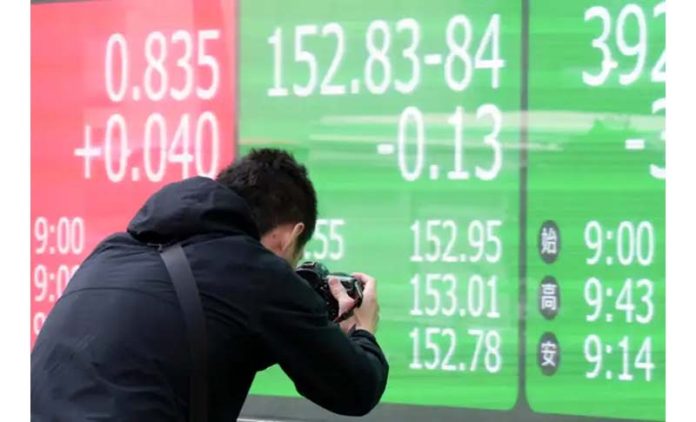BANGKOK, Apr 11 : Asian shares were mixed Thursday after US stocks fell on worries that what had seemed like a blip in the battle to bring down inflation may be a troubling trend.
Oil prices edged higher and US futures were flat.
South Korean shares were little changed after the ruling conservative party suffered a crushing defeat in a parliamentary election. The Kospi edged less than 0.1 per cent higher, to 2,708.15.
The results were a huge political blow to President Yoon Suk Yeol, and Prime Minster Han Duck-soo and all Yoon’s senior presidential advisers except those in charge of security issues submitted their resignations Thursday.
Elsewhere in Asia, Tokyo’s Nikkei 225 lost 0.4 per cent to 39,432.61 and the Hang Seng in Hong Kong was down 0.6 per cent, at 17,037.80.
The Shanghai Composite index gained 0.4 per cent to 3,038.68 and the S&P/ASX 200 fell 0.4 per cent to 7,816.00.
Bangkok’s SET lost 0.5 per cent and Taiwan’s Taiex was down 0.3 per cent.
On Wednesday, the S&P 500 dropped 0.9 per cent to 5,160.64. The Dow Jones Industrial Average dropped 1.1 per cent to 38,461.51, and the Nasdaq composite fell 0.8 per cent to 16,170.36.
Treasury yields leaped as bond prices fell, raising the pressure on the stock market, after a report showed inflation was hotter last month than economists expected. It’s the third straight report to suggest progress on bringing high inflation down may be stalling.
For shoppers, that’s painful because of the potential for even higher prices at the store. For Wall Street, it raises fears that the Federal Reserve will hold back on delivering the cuts to interest rates that traders are craving and have been betting on.
The Fed has been waiting for more evidence to show inflation is heading sustainably down toward its goal of 2 per cent. After an encouraging cooling last year, the fear now is that inflation may be stuck after January’s, February’s and March’s inflation reports all came in hotter than expected, along with data on the economy generally.
Prices for everything from bonds to gold fell immediately after the morning’s release of the inflation data.
The yield on the 10-year Treasury jumped to 4.54 per cent from 4.36 per cent late Tuesday and is back to where it was in November. The two-year yield, which moves more on expectations for Fed action, shot even higher and rose to 4.97 per cent from 4.74 per cent.
Traders sharply cut back on bets that the Fed could begin cutting rates in June. At the start of the year, they were forecasting six or more cuts through 2024.
High interest rates work to undercut inflation by slowing the economy and hurting investment prices. The fear is that rates left too high for too long can cause a recession.
Wall Street’s biggest losers on Wednesday included real-estate investment trusts, utility companies and other stocks that tend to get hurt most by high interest rates.
Real-estate stocks in the S&P 500 fell 4.1 per cent for the biggest loss by far among the 11 sectors that make up the index. That included a 6.1 per cent drop for office owner Boston Properties and a 5.3 per cent tumble for Alexandria Real Estate Equities.
Higher interest rates could chill the housing industry by making mortgages more expensive. Homebuilder D.R. Horton fell 6.4 per cent, Lennar sank 5.8 per cent and PulteGroup dropped 5.2 per cent.
Big US companies are lining up to report profits earned during the first three months of the year, and Delta Air Lines helped kick off the reporting season by delivering better-than-expected results.
The airline said it’s seeing strong demand for flights around the world, and it expects the strength to continue through the spring. But it also refrained from raising its profit forecast for the full year. Its stock climbed as much as 4 per cent during the morning before flipping to a loss of 2.3 per cent.
In other trading early Thursday, US benchmark crude oil gained 10 cents to USD 86.31 per barrel in electronic trading on the New York Mercantile Exchange.
Brent crude, the international standard, added 12 cents to USD 90.60 per barrel.
The US dollar fell to 152.92 Japanese yen from 152.34 yen. It hit a 34-year high above 153 yen on Wednesday. The yen has weakened on expectations that the gap between interest rates in Japan, which are near zero, and those in the US will remain wide for the foreseeable future.
The euro rose to USD 1.0747 from USD 1.0746. (AP)


